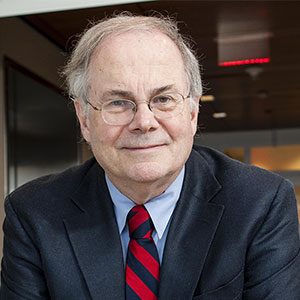Petsko receives National Medal of Science
In October, President Joe Biden awarded the National Medal of Science and the National Medal of Technology and Innovation to 20 Americans who have made exemplary achievements in science, technology and innovation to strengthen the nation’s well-being. Among those awarded the National Medal of Science was Gregory Petsko, who has been an American Society for Biochemistry and Molecular Biology member since 1987.

The National Medal of Science is the nation’s highest scientific honor. Since 1959, it has been bestowed on “individuals deserving of special recognition for their outstanding contributions in biology, computer sciences, education sciences, engineering, geosciences, mathematical and physical sciences, and social, behavioral, and economic sciences, in service to the nation.”
Petsko is a professor of neurology at Brigham & Women’s Hospital and Harvard Medical School. In his early career, Petsko’s lab was dedicated to understanding enzymes’ catalytic activity and structure. He and his colleague Dagmar Ringe made foundational discoveries in structural biology, including obtaining the first time-lapse images of the complete catalytic cycle of cytochrome P450 at an atomic resolution using low-temperature X-ray crystallography.
Since the early 2000s, his research has focused on finding treatments for neurodegenerative diseases such as Alzheimer’s, Parkinson’s and amyotrophic lateral sclerosis, or ALS. His team developed a gene therapy for the most common form of ALS. This gene therapy induces overexpression of the nonsense-mediated decay factor UPF1 and reduces neuronal toxicity in human cell culture and rodent models of ALS. In addition, Petsko and his colleague Scott Small have developed therapeutics for Alzheimer’s and Parkinson’s. All of these therapies will soon be tested in clinical trials.
His many awards include the Siddhu Award and the Martin J. Buerger Award from the American Crystallographic Association, the Pfizer Award in Enzyme Chemistry from the American Chemical Society, the Lynen Medal, the McKnight Endowment for Neuroscience Brain Disorders Award, a Guggenheim fellowship and the Max Planck Prize.
He is a member of the American Association for the Advancement of Science, the National Academy of Sciences, the National Academy of Medicine, the American Academy of Arts and Sciences and the American Philosophical Society. In addition, Petsko is a past president of the ASBMB and also of the International Union of Biochemistry and Molecular Biology.
The press release from the White House stated: “Those who earn these awards embody the promise of America by pushing the boundaries of what is possible. These trailblazers have harnessed the power of science and technology to tackle challenging problems and deliver innovative solutions for Americans, and for communities around the world.”
Enjoy reading ASBMB Today?
Become a member to receive the print edition four times a year and the digital edition monthly.
Learn moreGet the latest from ASBMB Today
Enter your email address, and we’ll send you a weekly email with recent articles, interviews and more.
Latest in People
People highlights or most popular articles

The data that did not fit
Brent Stockwell’s perseverance and work on the small molecule erastin led to the identification of ferroptosis, a regulated form of cell death with implications for cancer, neurodegeneration and infection.

Building a career in nutrition across continents
Driven by past women in science, Kazi Sarjana Safain left Bangladesh and pursued a scientific career in the U.S.

Kiessling wins glycobiology award
She was honored by the Society for Glycobiology for her work on protein–glycan interactions.

2026 ASBMB election results
Meet the new Council members and Nominating Committee member.

Simcox wins SACNAS mentorship award
She was recognized for her sustained excellence in mentorship and was honored at SACNAS’ 2025 National Conference.

From humble beginnings to unlocking lysosomal secrets
Monther Abu–Remaileh will receive the ASBMB’s 2026 Walter A. Shaw Young Investigator Award in Lipid Research at the ASBMB Annual Meeting, March 7-10 in Washington, D.C.

